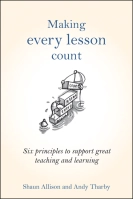At our school, all subject departments are in the process of creating knowledge organisers to support each unit of work. For the uninitiated, a knowledge organiser is a simple tool that provides clarity for both teachers and students. A successful knowledge organiser summarises and condenses all the most vital, useful and powerful knowledge on a single A4 page. We do not have a standard knowledge organiser template; each department designs them in a way that suits the bespoke needs of the subject discipline. For example, here is the knowledge organiser the English department have designed to teach John Steinbeck’s Of Mice and Men to Year 9:

Knowledge organisers are all the rage at the moment. However, if they are going to help support learning and retention, departments and teachers must be very clear about their purpose and how to use them effectively. Used well, a knowledge organiser can support students in grasping the foundational concepts that will pave the way for future learning. Used badly, then it is little more than a list of disassociated, indigestible facts – another thing to glue neatly into the back of an exercise book and forget about. At our school, knowledge organisers are used as a focused curriculum guide for teachers and a revision tool for students. They also lie at the heart of our literacy strategy: departments use them to list the relevant Tier 2 and Tier 3 vocabulary that will be taught in the lessons.
Once the most important facts and concepts have been taught, the knowledge organiser can be used as the basis for retrieval practice. In simple terms, retrieval practice involves using a cue – usually a question – to test previously covered material. The act of dredging up knowledge from memory, or retrieving it, increases the likelihood that it will be remembered next time, and the harder it is to recall this knowledge, the more powerful the effect. Testing not only shows what a student knows at a given point in time but also increases the likelihood that the material will be remembered later. Studies also show that the best way to revise is to repeatedly test yourself; it is a far more powerful method than rereading or restudying the material. Quizzing, multiple-choice questions and flashcards are all effective forms of retrieval practice.
In a recent INSET, we discussed how knowledge organisers can be used to support retrieval practice:
- Design the knowledge organiser in a way that makes quizzing easy. For example, make sure that key words and definitions are in separate boxes so that children can cover them up and test themselves.
- Retrieval practice needs to be cumulative. Don’t just test something once and assume it has been learnt for ever. Make sure that key concepts from the knowledge organiser are repeatedly tested and that the questions are reworded and rephrased so that students have to think carefully about the answers.
- Use knowledge organisers to support self-checking after completing a task.
- Teachers can use knowledge organisers for on-the-spot questioning. Hold your knowledge organiser in front of you and use it to ask students quick fire questions. This takes no planning and provides a great way to help them to automatise their knowledge.
- Students can highlight what they know on the knowledge organiser to gauge their learning and track their way through the curriculum. You could even collect these in and then use this feedback to help you to plan future lessons and revision sessions.
- Use the same knowledge organiser for all students but differentiate delivery. It is important that all students are challenged to learn everything on the knowledge organiser. Remember, that many students will learn far more than that specified on the knowledge organiser.
- Do not allow students access to knowledge organiser when they are tested. Retrieval practice must come from memory, not notes in an exercise book.
- Do not test everything at once. Break it up and test it bit by bit. Make sure they achieve success on these tests as this will breed confidence.
There are plenty of ways to use knowledge organisers to support retrieval practice and more. Please add any other ideas you have in the comments below.
If you would like to know more about retrieval practice and other evidence-informed strategies for boosting memory, we are running a three-day training programme at Durrington Research School – on 1st October 2018, 6th February 2019 and 10th June 2019. The course will help you to understand and evaluate the evidence and, more importantly, support you in implementing and mobilising it in your classroom, department and school. For more information and booking, please follow this link.










“Make sure they achieve success on these tests as this will breed confidence.” Indeed it will but surely that’s up to the students? This sounds a little like putting success solely on the shoulders of teachers, which is – I’m sure – not what you meant.
Perhaps it’s more useful to have specific steps teachers can take to encourage students to achieve success such as mandating this as homework, testing regularly, reducing the stakes on the tests (e.g. self-marking / not usually / initially counting scores), giving students different ways to interrogate the information (various forms of quizzing, both digital and non-digital) etc.
Thanks for the post. Will you be sharing your knowledge organisers on the blog or elsewhere, such as knowledgeorganisers.com?
Reblogged this on THE CHA WEEKLY READER and commented:
Here is an excellent, succinct, guide to use of knowledge organisers with your classes. Remember that they are only as effective as you make them but with these ideas you should have no problem in ensuring your students retain knowledge in the long term.
Pingback: Organising Knowledge – KBA Teaching and Learning
Pingback: Knowledge Organisers: Tackling the Misconceptions | Class Teaching
Pingback: Knowledge Organisers: Tackling the Misconceptions | Kesgrave High School
Pingback: EFFECTIVE FLASHCARDS – Teaching & Learning @ CCHS
Pingback: Knowledge Organisers: Making them worth more than the paper they’re written on | Class Teaching
Pingback: Knowledge Organisers: Making them worth more than the paper they’re written on | Kesgrave High School